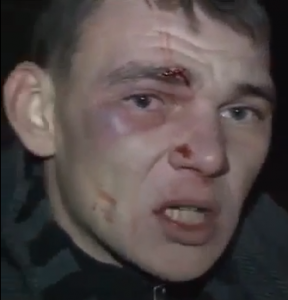Over the weekend at a prison in Kopeysk [1], just outside the city of Chelyabinsk, roughly 250 inmates began a protest atop one of the complex's buildings, waving banners [2] [ru] that begged “help us please” and complained of torture and extortion. Penal Colony 6 (known simply as “shestyorka”) has a history of prison abuse, and even Chelyabinsk Governor Mikhail Yurevich recently blamed [3] [ru] the region's prison system for causing “an enormous number of suicides.” Described in the Russian media and blogosphere as a “bunt” (an uprising), Kopeysk's inmates have by all accounts refrained from actual violence. Instead, they have merely refused to come down from the roof of one of the prison's buildings. Many inmates have also declared a hunger strike.
Blogging for the online project Gulagu.net [4] [ru] (“no to the Gulag”), Oksana Trufanova has reported from the ground in Kopeysk. (Trufanova coordinates the Chelyabinsk chapter of “Russkii Verdikt [5],” a nationalist organization dedicated to defending Russians charged with racist extremism.) Her first post [6] [ru] about the prison story, published November 24, has almost 900 comments at this moment. Since then, Trufanova has documented skirmishes between anti-riot police and prisoners’ relatives outside the prison gates. She herself sustained an injury [7] [ru] on Saturday, claiming that guards attacked her and a group of other civilians without provocation. Several videos circulating on YouTube (see below) feature men with bleeding head wounds, apparently the result of clashes with law enforcement, after venturing too close to the prison's entrance. In one video, viewers can see a car with a window shield nearly smashed through by police batons.
http://youtu.be/iJ6-5QjNkgY [8]
LiveJournal user Oleg Lurie has blogged several times about the situation in Kopeysk, also posting [9] [ru] YouTube interviews with three past prisoners, each of whom claims to have been tortured during his incarceration in the Chelyabinsk oblast. Lurie has also criticized the work of Alexey Sevastianov, the regional government's human rights ombudsman. “Some ‘human rights defenders’ […] are trying to present [these skirmishes between police and prisoners’ relatives] as the planned act of malicious troublemakers,” Lurie complained on November 25.
Angering many, Sevastianov has endorsed [10] [ru] police reports that the crowd outside the prison attacked guards with snowballs, bottles, and iron pipes. Chelyabinsk's human rights czar also disappointed many of the inmates’ supporters when he examined [3] [ru] “Prisoner Georgii D” (whose rumored beating was key in instigating the current unrest) and declared that the inmate's body showed no signs of injury.
 [8]
[8]Screenshot of injured civilian outside Kopeysk prison gates, YouTube, video by parvidos, 25 November 2012.
Russian Twitter users have adopted the hashtag #ИК6бунт [11] (“penal colony 6 bunt”) to mark posts about the Kopeysk uprising. In Moscow, a protest took place earlier today in support of the Chelyabinsk prisoners and “against torture in Russian jails.” (On Facebook [12] and VKontakte [13], roughly 175 people RSVP'd to attend.) In advance of the demonstration, oppositionist Ilya Klishin mused on Facebook [14] [ru] about the story's media coverage:
Обсуждения бунта в колонии Копейска (правильнее говорить акции неповиновения) обнажили ключевую, в общем-то, проблему. Мы остаемся кастовым, сословным, классовым обществом, наполовину архаичным, наполовину постмодернистским. И идея всеобщих гражданских прав для нас все еще остается революционной.
The discussion about the bunt in the [prison] colony in Kopeysk (it's more accurate to call it an act of disobedience) has laid bare a rather key problem: we've remained a caste-, class- society, half archaic and half postmodern. And the idea of universal civil rights is still a revolutionary one for us.
Writing on Facebook [15] [ru], Grigory Melkonyants, the deputy director of Golos (an opposition-leaning election-monitoring organization), published a news story [16] [ru] from the Chelyabinsk prison system's website, announcing that Penal Colony 6 had acquired a 3D flat screen television just days before the uprising. “This is the f—ing end,” Melkonyants joked, before adding, “File this under ‘a parallel reality.'”
While most reports now indicate that the crowd outside Penal Colony 6 has dwindled, some relatives are trying — and occasionally succeeding — to penetrate the prison walls. Identifying herself to journalists [3] [ru] as a sister of one of the protesting inmates, Olga Belousova is one example of someone who snuck past guards and reached her brother inside. While this no doubt was a great emotional high for the Belousovs, the fact that civilians are indeed infiltrating the prison does complicate the narrative now popular among netizens that despotic police are arbitrarily and unnecessarily using violence against a law-abiding congregation of concerned kith and kin.